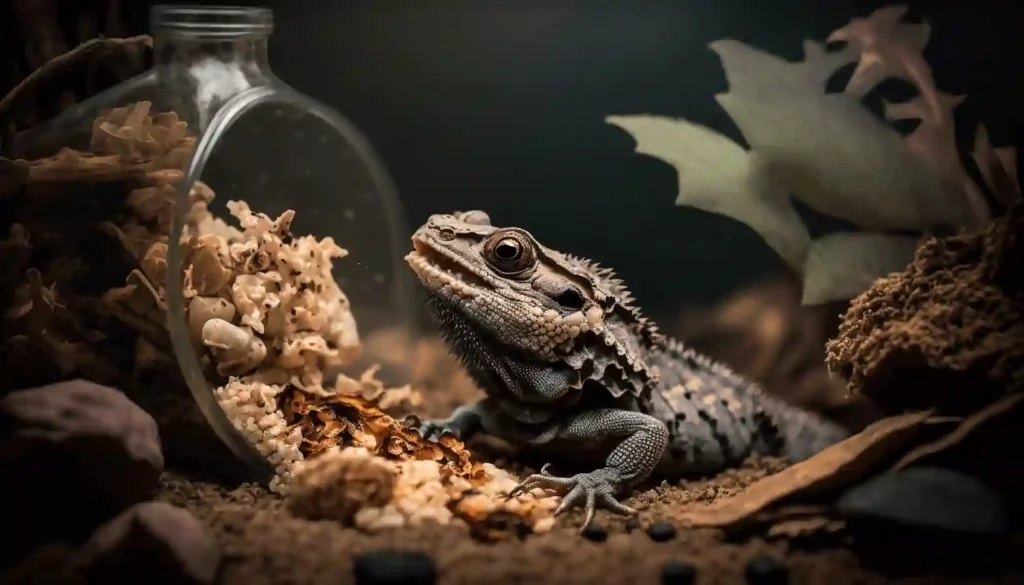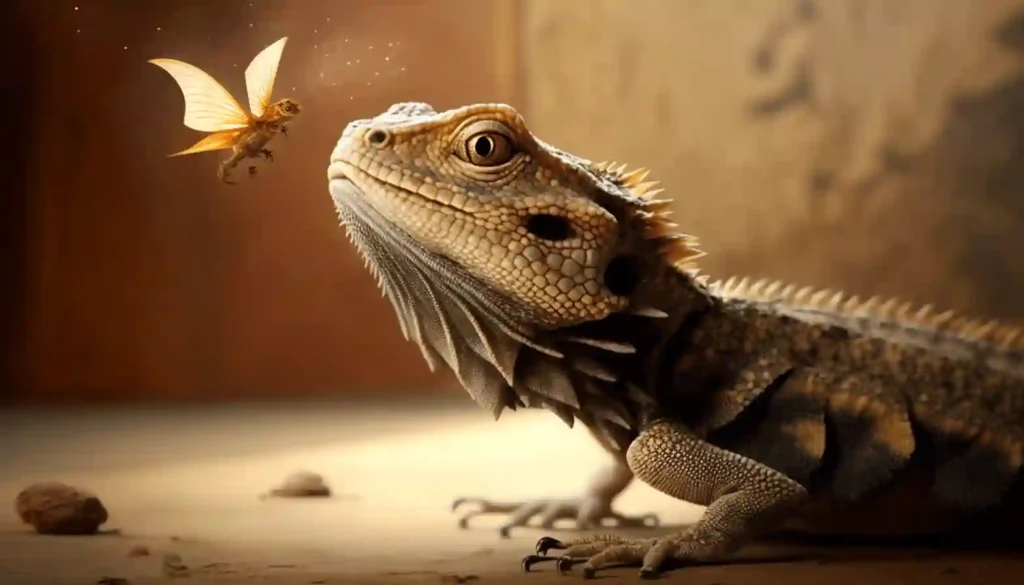Yes, bearded dragons can eat flies, including fruit flies and houseflies. Flies do not provide adequate nutrition compared to other insects.
Most fly species are scavengers that eat spoiled food and carry disease-causing bacteria or harmful substances.
It is recommended to buy only black soldier flies or fruit flies from pet stores to avoid this danger.
What Kinds Of Flies Are Good For Your Beardies?
It’s important to do research and be knowledgeable about what kind of insects make up a healthy diet for these reptiles.
Mealworms, wax worms, crickets, super worms, dubia roaches, locusts, silkworms, fruit flies, and hornworms are good choices when it comes to feeding your beardie.
Soldier grubs can also provide a variety of vitamins and minerals that will benefit the dragon’s health.
You should always ensure that any insect or feeder you give your reptile has been bred in captivity as they tend to have higher nutritional value than wild-caught insects.
It’s advisable to only feed pre-killed insects so there is no risk of injury or infection from live prey.
If you take the time to select appropriate feeders and monitor their nutrition carefully, flies can be part of a healthy diet for your beardie.
Where To Get Flies For Your Bearded Dragon?
Live food is essential in a bearded dragon’s diet and there are several sources available when it comes to buying flies.
One option is to buy live flies from pet stores or online retailers who specialize in selling insects as feeders.
You can also raise your own black soldier fly larvae at home if you have the space and resources to do so.
Finally, you can find many places that offer flies for sale near you; this way, you will be sure of getting fresh ones each time.
No matter which method you choose, make sure that the flies you give your dragon come from a reliable source.
This will ensure they stay healthy while providing all the nutrition needed by your reptile friend.
Nutritional Value Of Black Soldier Fly Larvae
Black soldier fly larvae (BSFL) have a high nutritional value and are recognized as an alternative source of protein for animal feed. Here are some key points about the nutritional value of black soldier fly larvae:
- Protein: The dry weight of black soldier fly larvae can contain up to 50% crude protein. They are rich in essential amino acids and have an amino acid profile similar to that of fishmeal. Black soldier fly larvae are a good source of protein for poultry, pigs, and various species of fish and shrimp.
- Lipids: Black soldier fly larvae can contain up to 35% lipids. They have the ability to synthesize and process unsaturated fatty acids, which are important in the diet of livestock.
- Minerals: Black soldier fly larvae are rich in minerals such as calcium, iron, magnesium, sodium, zinc, and potassium. These minerals are important in the diet of humans and animals.
- Other Nutrients: Black soldier fly larvae are also rich in other essential nutrients required by animals. They have a high fat content, making them a valuable food source. The larvae are large and fat, making them easy to collect and feed to animals.
It is worth noting that the nutritional composition of black soldier fly larvae can vary depending on factors such as the organic substrates they are reared on and the processing methods used. However, overall, black soldier fly larvae are considered to be a highly nutritious and sustainable protein source for animal feed.
Benefits Of Feeding Black Soldier Fly Larvae To Your Bearded Dragons

Feeding black soldier fly larvae (BSFL) to your bearded dragons can provide several benefits due to their nutritional content. Here are the benefits of feeding black soldier fly larvae to your bearded dragons:
- High Calcium Content: Black soldier fly larvae have a naturally high calcium content, which is essential for the healthy growth and development of bearded dragons. Calcium is crucial for maintaining strong bones and preventing metabolic bone disease, a common condition in reptiles.
- Protein-Rich: Black soldier fly larvae are also high in protein, which is important for muscle development and overall growth in bearded dragons. Protein is an essential nutrient that supports various bodily functions and helps maintain a healthy immune system.
- Essential Nutrients: Black soldier fly larvae are rich in other essential nutrients, such as vitamins and minerals, that are necessary for the overall health and well-being of bearded dragons. These nutrients contribute to proper digestion, energy production, and overall vitality.
- Hydration: Feeding black soldier fly larvae can also help hydrate your bearded dragons. The larvae have a high moisture content, which can be beneficial, especially for bearded dragons that may not drink water readily.
To ensure optimal nutrition, it is recommended to feed adult bearded dragons a minimum of 10-15 black soldier fly larvae per day during their feeding cycle.
However, it’s important to consult with a reptile veterinarian or do further research to determine the specific dietary needs of your bearded dragon, as individual requirements may vary.
Overall, incorporating black soldier fly larvae into your bearded dragon’s diet can provide them with a nutritious and balanced food source that supports their growth, development, and overall health.
Dangers Of Flies To Bearded Dragons

Flies can pose several dangers to bearded dragons, as indicated by the following search results:
- Poisonous bugs: Some bugs, such as fireflies, harlequin bugs, and centipedes, are considered poisonous to bearded dragons.
- Disease transmission: Flies can carry harmful bacteria and parasites that can cause digestive problems and other health issues in bearded dragons.
- Nutritional value: House flies lack nutrition and are one of the worst food sources for bearded dragons.
Based on these findings, it is generally not recommended to feed flies to bearded dragons.
While some species of flies may be safe for consumption, they offer little to no nutritional value and can carry harmful bacteria and parasites.
It is important to provide bearded dragons with a balanced and varied diet that meets their nutritional needs.
How Often Should Bearded Dragons Eat Flies?
Bearded dragons should be fed flies no more than once a week.
This frequency allows the beardie to get enough nutrition without overfeeding them or causing health issues due to too much fat and protein.
It is also important to make sure that the amount of flies given is appropriate for the size of your bearded dragon; it’s best not to feed too many at one time because this could lead to indigestion.
Generally speaking, you should provide no more than 5-6 small flies per meal for an adult bearded dragon.
When feeding your pet regularly with flies, keep in mind that frequent feeding can cause digestive problems.
Also, ensure there are plenty of vegetables and other food sources available so they don’t become overly reliant on just eating insects.
By providing variety in their diet, you’ll help them stay healthy and happy.
What Can Bearded Dragons Eat Instead Of Flies?

Bearded dragons can eat a variety of insects and worms, and there are many better options than flies. Here are some of the best insects to feed bearded dragons:
- Dubia Roaches
- Goliath Worms
- Wax Worms
- Mealworms
- Crickets
- Phoenix Worms (Black Soldier Fly Larvae)
- Butterworms
These insects provide a variety of nutritional benefits such as fat, high water content, protein, and calcium, so some are choice staple foods while others should only be used as treats or supplementally.
Black soldier fly larvae, also known as phoenix worms or nutrigrubs, are one of the most nutritious bug foods you can give your bearded dragon.
They are an excellent source of protein and calcium, making them great for baby bearded dragons because of their size and high nutrition content which is important for a baby’s growth and development.
When feeding insects to bearded dragons, make sure they are bought from the pet store and not caught in the wild, as wild insects may carry parasites or diseases that can harm your pet.
